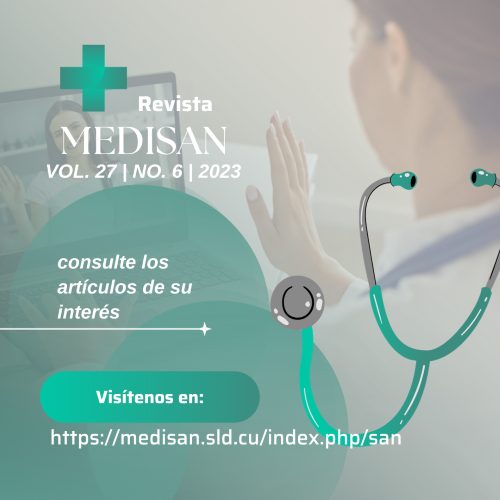Bienestar y salud ocupacional de docentes universitarios en la formación investigativa mediante el teletrabajo
Palabras clave:
emergencia sanitaria, enseñanza virtual, satisfacción laboral, teletrabajo, salud ocupacional, profesores universitarios.Resumen
Introducción: La COVID-19 provocó cambios laborales e influyó en el comportamiento de los docentes universitarios.
Objetivo: Describir el bienestar y la salud ocupacional en la formación investigativa de docentes universitarios mediante el teletrabajo.
Métodos: Se realizó un análisis sistemático mediante la metodología PRISMA que incluyó todo el año 2022 y los primeros meses del 2023. Con los artículos de inclusión se aplicó la inteligencia artificial Litmaps para la red de conexión. Se aplicó un cuestionario y posteriormente se aplicó la escala de Likert. El instrumento se validó con el coeficiente alfa de Cronbach. Se consideró la prueba t de una muestra para probar como hipótesis descriptiva si el bienestar y la salud ocupacional desde la formación investigativa en docentes universitarios mediante el teletrabajo eran satisfactorios.
Resultados: En el estudio 41,2 % de los artículos de revisión e investigación seleccionados con la metodología PRISMA correspondieron al año 2022. Sin embargo, el 50,0 % de los artículos semillas fueron del 2023, donde su análisis mapa indicó que no hubo citas de correspondencias. En cuanto al resultado de la valoración con la escala de Likert, y luego, con la prueba de hipótesis, se obtuvo insatisfacción en los docentes universitarios hacia la formación investigativa mediante el teletrabajo.
Conclusiones: Existió insatisfacción respecto al bienestar y la salud ocupacional para la formación investigativa desde el teletrabajo porque los docentes universitarios consideraban que las condiciones laborales no fueron favorables.
Descargas
Citas
2. Haghparast P, Fisher D, Lewing B, Sansgiry SS. Factors Associated With Intention to Pursue Pharmacy Residency: The Undecided Student Issue. Heal Prof Educ. 2020 [citado 19/01/2023];6(2):170-5. Disponible en: https://doi.org/10.1016/j.hpe.2020.02.003
3. Bucci KK, Knapp KK, Ohri LK, Brooks PJ. Factors motivating pharmacy students to pursue residency and fellowship training. American Journal of Health-System Pharmacy. 1995 [citado 27/01/2023];52(23):2696-701. Disponible en: https://doi.org/10.1093/ajhp/52.23.2696
4. Patel PS, Vyravanathan S, Milne E, Bezjak A, Wouters BG, Bennewith K, et al. Strategic Training in Transdisciplinary Radiation Science for the 21st Century (STARS21): 15-Year Evaluation of an Innovative Research Training Program. Int J Radiat Oncol Biol Phys. 2021 [citado 04/02/2023];110(3):656–66.
5. Dare L, Nowicki E. ‘The road less travelled’: grade-level acceleration in inclusive schools. Int J Incl Educ. 2020 [citado 08/03/2023];27(2):1-18.
6. Xiaofei Y, Min A, Xiaofeng Z. Development of preservice teachers’ competence beliefs, career values, and perceptions of teaching as a profession: A longitudinal study. Heliyon. 2023 [citado 11/04/2023];9(3):e13918. Disponible en: https://doi.org/10.1016/j.heliyon.2023.e13918
7. Adams B, Thomas L, Moens M, Valcke M. University teachers as versatile masters: Evaluating the effectiveness of a professional development programme on student-centred teaching competencies. Stud Educ Eval. 2023 [citado 16/08/2023];77:101260. Disponible en: https://doi.org/10.1016/j.stueduc.2023.101260
8. Finefter-Rosenbluh I, Power K. Exploring preservice teachers’ professional vision: Modes of isolation, ethical noticing, and anticipation in research communities of practice. Teach Teach Educ. 2023 [citado 17/09/2023];132:104245. Disponible en: https://doi.org/10.1016/j.tate.2023.104245
9. Pagea MJ, McKenzie JE, Bossuyt PM, Boutron I, Hoffmann TC, Mulrow CD, et al. The PRISMA 2020 statement: an updated guideline for reporting systematic reviews. Rev Esp Cardiol. 2021 [citado 03/09/2023];74(9):790-9. Disponible en: https://doi.org/10.1016/j.recesp.2021.06.016
10. Cronbach LJ. Coefficient alpha and the internal structure of tests. Psychometrika. 1951 [citado 02/07/2023];16: 297-334. Disponible en: https://doi.org/10.1007/BF02310555
11. Heiden M, Widar L, Wiitavaara B, Boman E. Telework in academia: associations with health and well-being among staff. Higher Education. 2021 [citado 04/04/2023];81:707-22. Disponible en: https://doi.org/10.1007/s10734-020-00569-4
12. Lecours A, Gilbert MH, Lord MM, Labrecque C, Bouche F. Telework in a pandemic context: protocol of a participatory study on the effects of teleworking conditions on the well-being and social participation of workers. BMJ Open. 2021 [citado 16/05/2023];11(8):e051099. Disponible en: https://www.ncbi.nlm.nih.gov/pmc/articles/PMC8387739/
13. Omodan BI, Ige OA. University students' perceptions of curriculumcContent delivery during COVID-19 new normal in South Africa. Qualitative Research in Education. 2021. [citado 16/05/2023];10(2):204-27. https://hipatiapress.com/hpjournals/index.php/qre/article/view/7446/3400
14. Ajjawi R, Fischer, J, Tai J, Bearman M, de St Jorre TJ. “Attending lectures in your pyjamas”: student agency in constrained circumstances. Higher Education. 2023 [citado 17/05/2023];86:1363-76. Disponible en: https://doi.org/10.1007/s10734-022-00976-9
15. Houlden S, Veletsianos G. A synthesis of surveys examining the impacts of COVID 19 and emergency remote learning on students in Canada. Journal of Computing in Higher Education. 2022 [citado 23/07/2023];34:820-43. Disponible en: https://doi.org/10.1007/s12528-022-09323-4
16. Kaltiainen J, Hakanen JJ. Why increase in telework may have affected employee well-being during the COVID-19 pandemic? The role of work and non-work life domains. Current Psychology. 2023 [citado 29/07/2023]:1-9. Disponible en: https://doi.org/10.1007/s12144-023-04250-8
17. Morilla-Luchena A, Muñoz-Moreno R, Chaves-Montero A, Vázquez-Aguado O. Telework and Social Services in Spain during the COVID-19 Pandemic. Int. J. Environ. Res. Public Health. 2021 [citado 29/07/2023];18(2):725. https://doi.org/10.3390/ijerph18020725
Publicado
Cómo citar
Número
Sección
Licencia
Esta revista provee acceso libre e inmediato a su contenido bajo el principio de que hacer disponible gratuitamente investigación al público, apoya aún más el intercambio de conocimiento global. Esto significa que los autores/as conservarán sus derechos de autor y garantizarán a la revista el derecho de primera publicación de su obra, el cuál estará simultáneamente sujeto a la licencia internacional Creative Commons Atribución 4.0 que permite copiar y redistribuir el material en cualquier medio o formato para cualquier propósito, incluso comercialmente, además de remezclar, transformar y construir a partir del material para cualquier propósito.





